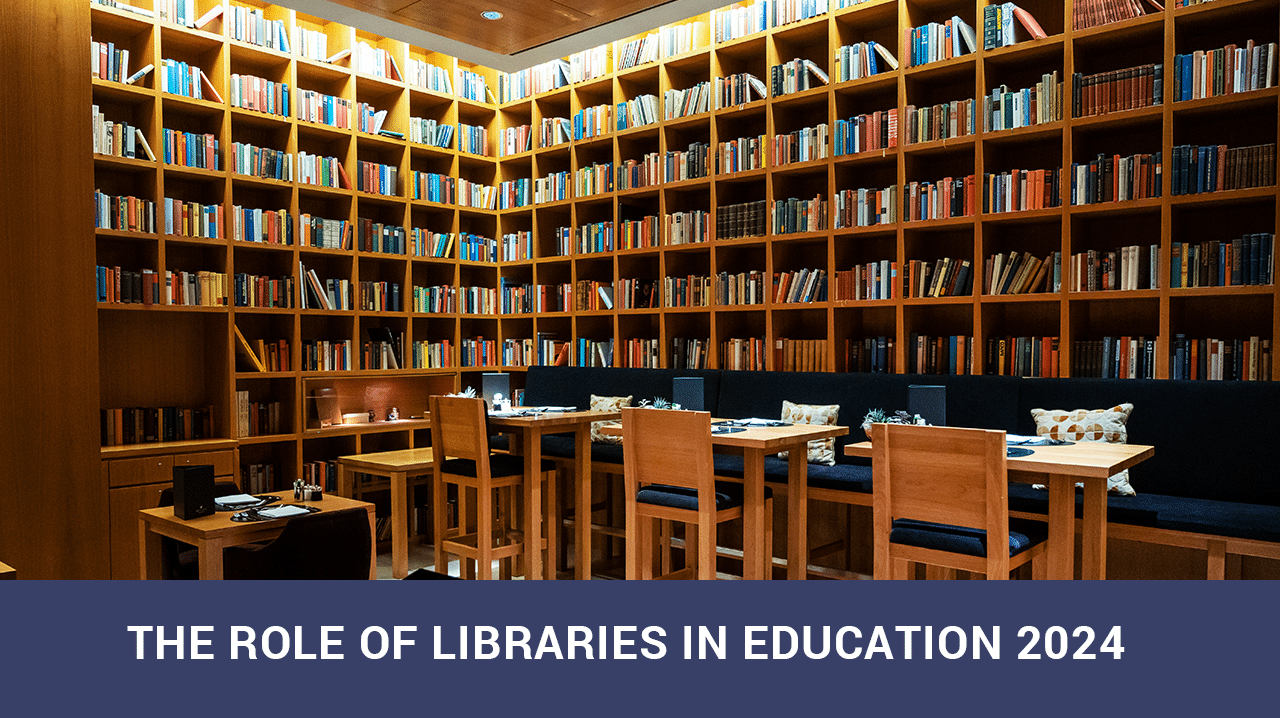The Role of Libraries in Education 2024

In today’s digital age, with information readily available, some may perceive libraries as less essential. However, they remain vital to academic excellence, fostering holistic learning.
Exploring libraries’ pivotal role in education reveals their diverse impacts on shaping young minds and empowering future generations.
These sanctuaries of knowledge serve as timeless bastions, enriching educational experiences and nurturing a love for learning that transcends technological advancements.
Digital Resources and Online Learning Platforms:
Libraries have effectively embraced the advancements in technology, seamlessly integrating digital resources and online learning platforms.
By granting access to e-books and interactive tutorials, students surpass the boundaries of conventional textbooks, immersing themselves in a vast pool of information and knowledge.
The Heart of Learning:
The heart of any educational institution lies in its library – a sanctuary that sparks curiosity and cultivates a flourishing pool of knowledge.
Beyond serving as mere book depositories, MIT Gurukul libraries are educational centers of intellectual exploration, fostering a climate of curiosity and lifelong education.
The importance of library in education is like a beacons of light, pointing the way for those seeking knowledge and achieving academic success.
Emerging Technologies:
- Augmented and Virtual Reality Fusion: CBSE schools in Pune lean on AR and VR to craft learning zones. Here, students interact with digital info in a real-world way.
- Virtual Tours and Interactive Steps Using VR: Libraries have virtual tours of their assets. They also provide interactive learning material, boosting access and interaction for visitors.
- Artificial Intelligence and Machine Learning in Use: Libraries apply AI and ML to automate services.
- Boosting Creativity and STEM Learning: With resources like robotics kits, laser cutting machines, and 3D printing, libraries promote creativity and STEM education.
Enhancing Academic Achievement:
Research consistently demonstrates that students who frequent libraries achieve higher academic success.
Libraries serve as catalysts for this achievement, offering access to supplementary resources and personalized guidance from experienced librarians.
By ensuring and developing an environment conducive to learning and growth, the role of libraries in education becomes indispensable partners in the academic journey, driving students toward excellence and realizing their full potential.
Expanding Knowledge Base:
1. Books and Stories: The importance of library in education promotes the love of reading and storytelling at our library.
2. Science and Tech: The library is full of science and technology resources. It supports research in STEM and helps people keep up with new ideas.
3. Past and Culture: Libraries hold a lot of history. It has old documents, archives, and artifacts.
4. Art and Imagination: Libraries love creative minds. It has books on art, catalogs, and digital materials to inspire all those who visit.
Choice and Convenience:
Libraries, in this age of excessive information, play a crucial role in gathering and organizing resources. This enables students to independently explore topics of personal interest at their desired speed.
With flexible operating hours and attentive interfaces, libraries prioritize convenience, making learning accessible to all.
In this way, MIT Gurukul libraries serve as inclusive havens of learning, meeting a range of requirements and encouraging curiosity in thought.
Fostering a Love for Reading:
Libraries preserve the ageless skill of reading and inspire a lifelong love of books and storytelling in a world where screens are taking over.
The importance of library in education promotes a deep respect for the written word by providing quiet areas for reflection and engaging reading experiences, which feed the imagination and the spirit.
In this digital age, libraries serve as sanctuaries where individuals can escape into the enchanting realms of literature, discovering the transformative power of words and embracing the joy of reading.
Preserving Knowledge for Generations:
- Sorting and Storing: Libraries work hard to sort and store historical items. They aim to protect our collective history for the people of tomorrow.
- Sharing Old Lessons: With old knowledge protected, libraries offer us gems from the past.
- Shaping the Knowledge Handover: MIT Gurukul Libraries act as connectors between various age groups, letting the elderly pass their knowledge to the youth.
Encouraging Collaboration and Creativity:
Libraries are important. They’re more than just books. They’re social places. They encourage people to share ideas, work together, and be creative.
With engaging study sessions and cross-disciplinary attempts, libraries cultivate an environment that fosters teamwork and ignites inventive thought, enhancing the educational journey into a collective adventure.
By offering a gathering place for diverse perspectives to intersect and thrive, Best ib Schools in Pune ignite a sense of inspiration that motivates individuals to push the boundaries of knowledge and embark on unexplored paths of creativity.
Helps the Teachers:
Libraries serve a significant purpose in assisting teachers beyond their conventional role as student resources.
By offering these valuable resources and assistance, libraries enhance the educational journey for both teachers and students alike.
- Libraries offer carefully chosen lesson plans and professional development opportunities for teachers.
- Access to resources empowers educators to excel in their craft.
Developing Research Skills:
Libraries are instrumental in fostering crucial research skills, empowering students to critically assess information and build informed arguments.
International boarding schools in pune also empower students to navigate the complex realm of information by granting them access to vast databases and scholarly journals.
A World of Resources at Your Fingertips:
- No More Borders: No corner of the world is too far to reach. Libraries offer a chance to dive into various cultures and viewpoints from all over the globe.
- Meeting the Whizzes: They connect anyone to scholarly brains through online events and platforms. This opens the door to working together and swapping ideas.
- Upgrading Learning: Libraries stockpile a massive range of resources from the world. This makes learning richer and encourages respect for different cultures and thoughts.
Promoting Literacy and Critical Thinking Skills:
Libraries play a major factor in improving our ability to read and think critically. They know that being literate isn’t just about reading and writing.
Libraries give us a chance to practice thinking deeply, speaking well, and safely exploring our world.
They help us grow basic skills that make us smart, lifelong learners. We become ready to tackle today’s challenges with wisdom and fearlessness thanks to libraries.
Instant Access to Educational Content:
The availability of digital libraries and online repositories has made educational content more easily accessible than ever before.
Students can now conveniently download e-books or stream educational videos, granting them immediate access to a huge selection of resources.
Libraries are essential assets in the educational domain, enhancing the learning process and enabling individuals to unlock their maximum capabilities.
Amidst the challenges posed by the digital era, it is crucial to acknowledge the enduring wisdom and irreplaceable resources offered by libraries. They continue to mold minds and shape futures for generations to come.

